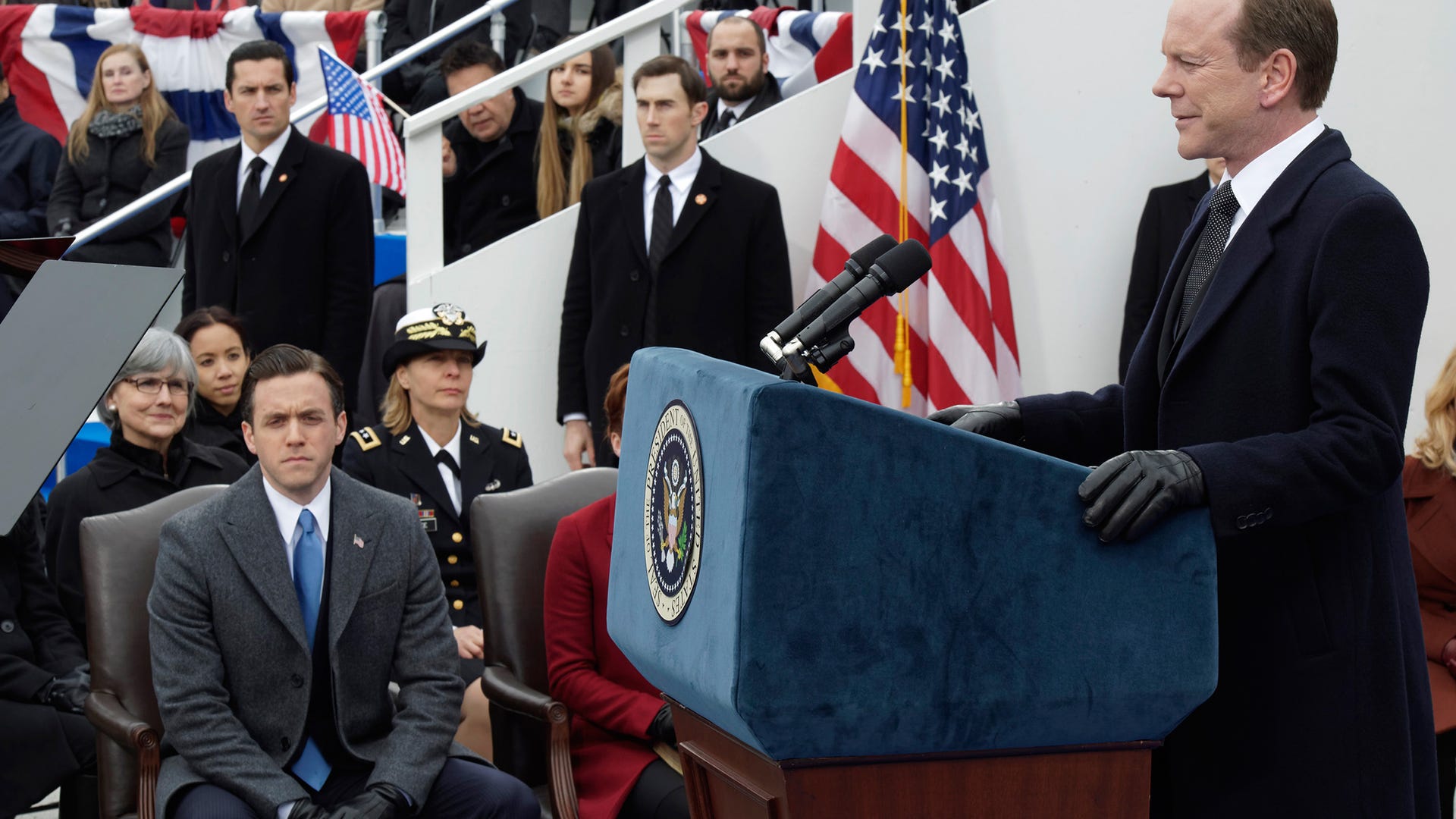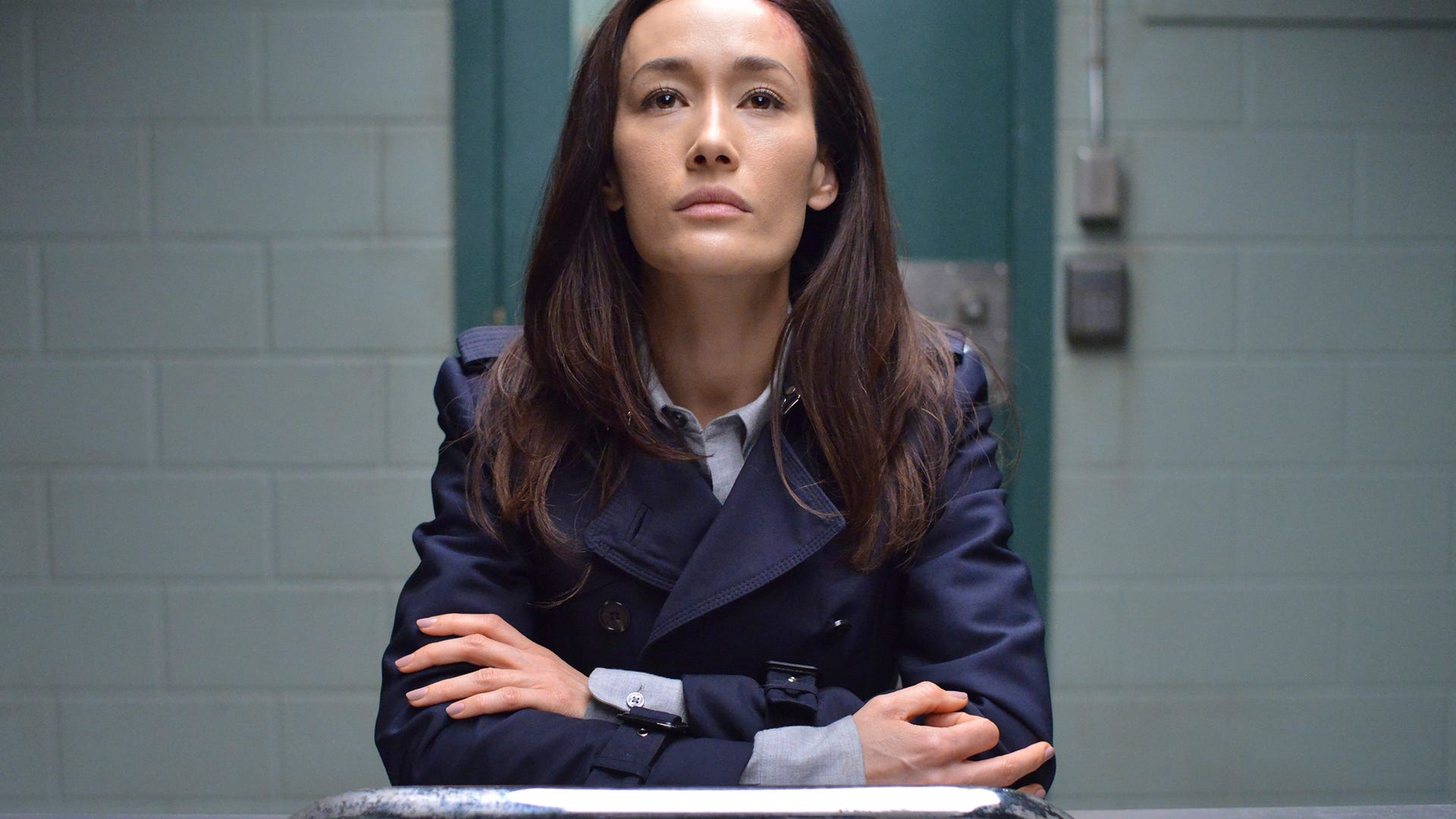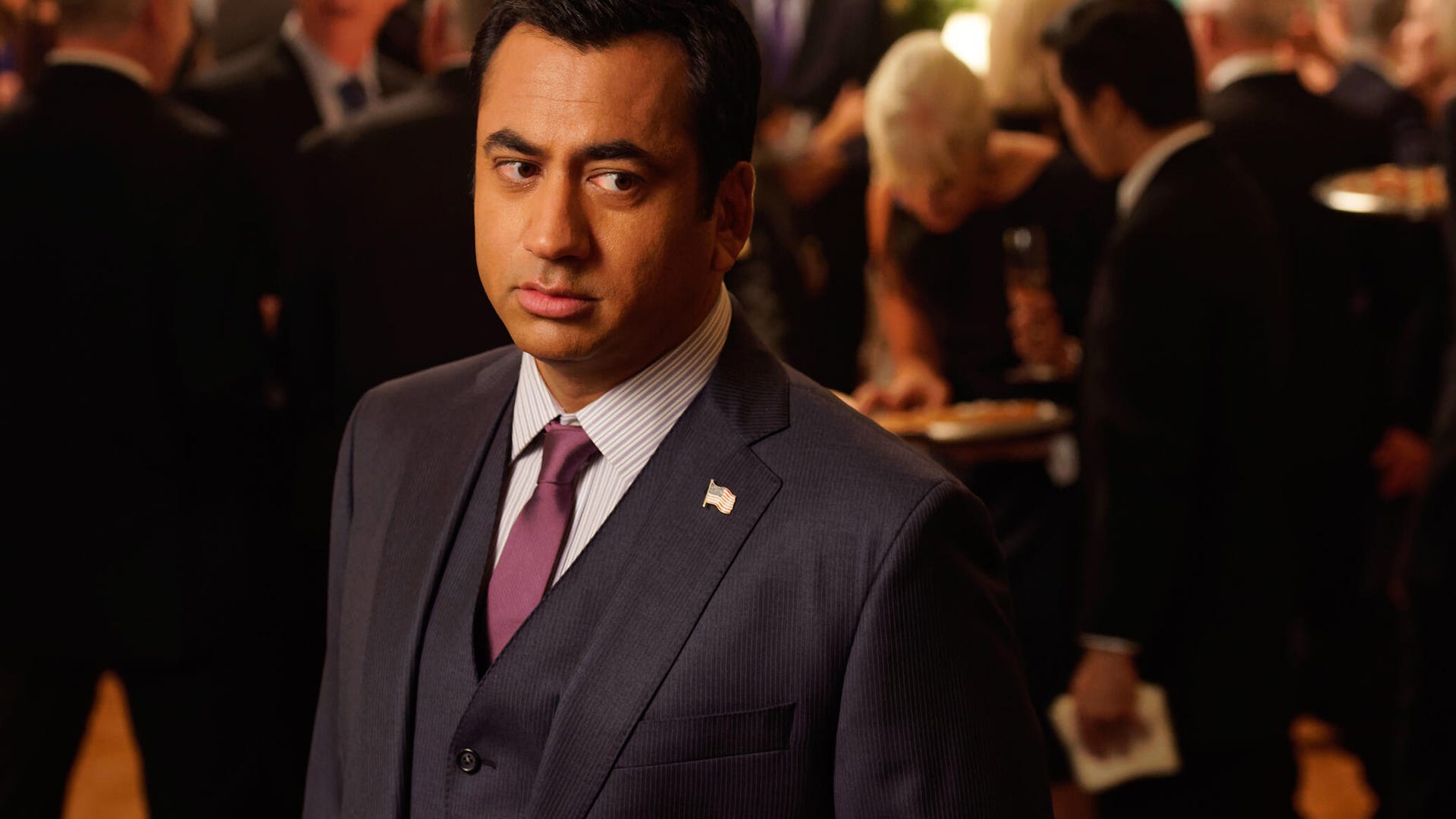Join or Sign In
Sign in to customize your TV listings
By joining TV Guide, you agree to our Terms of Use and acknowledge the data practices in our Privacy Policy.
Designated Survivor Bosses Tease Return, Aaron's Betrayal and Less Kirkman Family Drama
And are the producers mining the news for stories?
The last time we saw Designated Survivor, there was a bullet in midair intended for Tom Kirkman's (Kiefer Sutherland) forehead -- except we believe it was thrown off its target by the quick thinking (and hands) of FBI agent Hannah Wells (Maggie Q) as she popped a shot off at the would-be assassin.
More than two and half months of real time later, we'll finally see which unlucky sap will be the recipient of said bullet. (Promos for the second of half of Season 1 show a very healthy Kirkman walking around with no bullet holes in him, so it's a safe bet that he wasn't killed in the assassination attempt.)
Of course, Kirkman's assassination attempt isn't the only thing going on in Designated Survivor, so TVGuide.com got creator David Guggenheim and new showrunner Jeff Melvoin on the phone to talk about what's ahead, whether we should trust Aaron (Adan Canto) or not, what didn't work so well in the first half of the season and how Kirkman can stay independent in all this chaos.

Ashley Zukerman, Kiefer Sutherland; Designated Survivor
ABC/Ben Mark Holzberg
Let's go broad to start off. What's the tease for the second half of Season 1?
Jeff Melvoin: We left at a very exciting point, and as we move into the second half you'll see the conspiracy story deepening and we begin to come up with some answers. And as we begin to come up with some answers, and put some names to faces or faces to names, it also gives the president the opportunity to govern some more. You're going to see the show continue to be driven by the conspiracy, but you're also going to see the president grow in office and become his own. He's going to define his own 100 days agenda, restarting the clock in the second half because, as he notes, he wasn't given the opportunity to have his 100 days because of the way he came into office. It's an opportunity for him to write his own narrative, and it starts him on a new journey that we can all follow with excitement and interest.
The first half of the season showed extremely well the idea of what happens -- from the conspiracy angle -- how do you possibly recover from a tragedy of this magnitude. Now that we're in the second half, I think the political education of the president and his ability to govern begins to assume a larger role.
We've seen the promos, so we know that assassination attempt on Kirkman failed. He doesn't know as much as the audience knows, or as much as Hannah knows. Will Kirkman finally get wind of the conspiracy against the United States and his presidency?
David Guggenheim: I was literally just rewatching Episode 10 about an hour ago because I was live Tweeting it, and it was the first episode where really Kirkman is starting to get a sense of the conspiracy, he's the one who picks up on there's a traitor in the White House, it's actually the first time he hears Hannah's name in like 10 episodes. It's the first time he says the name Hannah Wells. We're very much building to that, you know, will they or won't they meet, and when they do they can bring their respective puzzle pieces together and see what forms.
Melvoin: Putting Kirkman and Hannah together does great things for the show.
Guggenheim: And that was always fun, how long can we go until they finally see each other and building to the moment when they finally do.
Will it happen in this half of the season?
Guggenheim: Yes.
Designated Survivor: Is Seth hiding something?

Maggie Q, Designated Survivor
ABC/Sven Frenzel
Moving on to Hannah and the conspiracy -- DUN DUN DUN -- it seems like every time Hannah turns over a stone and gets closer to the answer, she finds more stones. When will we learn who is behind it all, and is that part of the end game or does it open a new chapter for Designated Survivor?
Melvoin: That's a good question, I think we feel that we owe the audience some answers. And I think in the second half you'll see we begin to turn over cards and driving towards a conclusion that will be satisfying and not just open a door that leads to another door with more questions. We definitely feel that what's been constructed is very solid, very mysterious, but there's definitely answers to it.
Guggenheim: There's very much a plan in place, and like Jeff said, we're building to where we think is a very exciting and surprising and satisfying conclusion. I think the last thing we want is to mess around with the audience and promise them answers but never deliver, I don't like when shows do that.
Melvoin: It's one thing to tease an audience along, but then you have to satisfy them and account for what you've shown. And we believe that's part of our obligation in the back half and we feel that we're accomplishing that.
All season long you've shown Aaron doing something a little shady, and now Emily knows he leaked the How to Blow Up the Capitol guide. Will these two ever see that Elvis impersonator? What's in store for these two, especially Aaron?
Guggenheim: The fun of Aaron has always been, from Day 1, is is he good or bad? Where are his allegiances? Sometimes he looks like he's working for other people's interest, but it turns out it's his own. Sometimes you think he's looking out for his own interest, but it's for Kirkman. So that's always the guessing game with Aaron, and I think Adan does it extremely well. As far as the relationship with Emily, the fun of any show is bringing characters close and then tearing them apart and playing that drama.
Melvoin: There's a lot of change coming for both characters.
And what about Seth?
Guggenheim: Seth (Kal Penn) continues to get challenged even more so as press secretary. We introduce a new character that Rob Morrow is playing.
Melvoin: We introduce a very interesting investigative reporter who is every bit the equal of Seth in terms of smarts and persistence. So that's an interesting square off that happens in the second half. And one of the challenges as we get deeper into the conspiracy, what does Seth know and what does he not know? How far does the president bring him in? How can he be an effective press secretary if he doesn't know the truth?

Kal Penn, Designated Survivor
Ben Mark Holzberg
The show started with a three-pronged approach. You had Kirkman's fast rise to the presidency, you had the conspiracy and Hannah's story, and you had the Kirkman family drama that came with entering the White House. That last part seemed to fall off as the show went on, are you going back to that or do you think the show works better without it being a focus?
Melvoin: That's a great question, and one of the things when I was brought in and had the opportunity to look at what was working and what was not working -- and this has everything to do with how the show has evolved from a creative point of view, not anything to do with the actors -- the intent may have been to have a three-ring circus where every ring had its part, and they do, but they're not all the same size is what I think the viewers discovered. At least for this initial season, and probably beyond, the family can provide color and texture but not plot so much. I think where the show had a few missteps in the first 10 episodes was to try to put too much burden of plot on the family aspect of it. While you're trying to figure out who blew up the Capitol and killed a thousand people and trying to get your footing as the president when you've had no political experience, whatever is happening in the background family wise, while it's always important to the characters isn't quite so important to the audience or the plot itself. So the family remains vitally important, it's just a matter of to what degree and how we use them. At the moment they're more for accent and color than strict plot.
The current political climate is totally bananas right now. Does that ever seep into your work?
Melvoin: This was always the intent, regardless of who won the [2016] election, the idea of being able to put a man of morality and intelligence and great humanity and no experience into this job is a great opportunity to reflect our own fondest hopes and desires for what a good person could do in that position. So the course was set before the election. I think for certain viewers, the importance of the show may only increase over the couse of time, but we do not spend specific time talking in reference or contrast to what's going on, we really have our own course.
If anything, it gives you license to do anything outrageous in the plot, and it still wouldn't be as crazy as what's happening in real life.
Melvoin: I will say it does demonstrate that the office has latitude, so that increases our confidence in our ability to do things that might not be [believable otherwise].
Anything you'd like to add?
Guggenheim: Episodes 11, 12, 13, 14 and 15 I think are the best ones we've done. If you liked the first half, there's no way you're not going to love the second half. The twists and turns on a story level and an emotional level are firing on all cylinders.
Designated Survivor returns Wednesday, March 8 at 10/9c on ABC.
